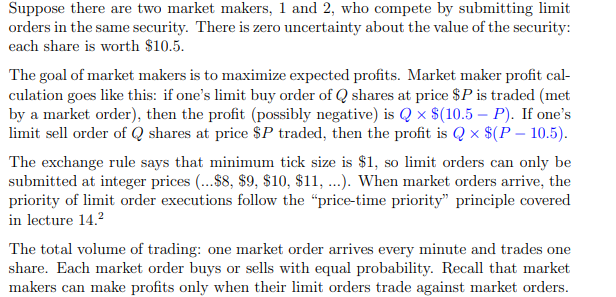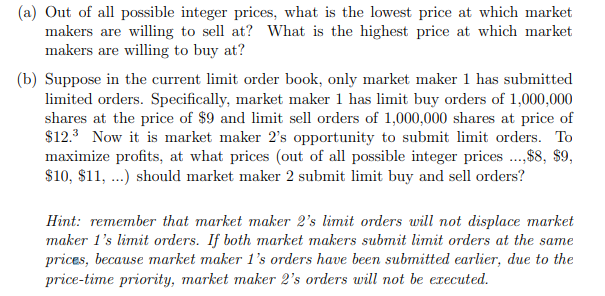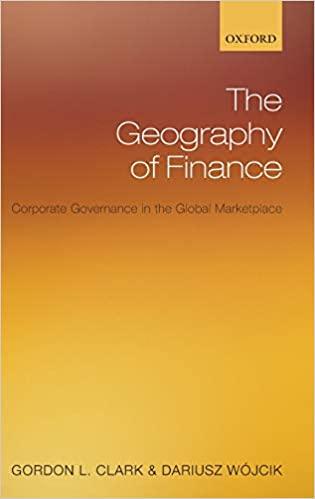

Suppose there are two market makers, 1 and 2, who compete by submitting limit orders in the same security. There is zero uncertainty about the value of the security: each share is worth $10.5. The goal of market makers is to maximize expected profits. Market maker profit cal- culation goes like this: if one's limit buy order of Q shares at price $P is traded (met by a market order), then the profit (possibly negative) is Q x $(10.5 P). If one's limit sell order of shares at price $P traded, then the profit is Q $(P 10.5). The exchange rule says that minimum tick size is $1, so limit orders can only be submitted at integer prices (...$8, $9, $10, $11, ...). When market orders arrive, the priority of limit order executions follow the "price-time priority" principle covered in lecture 14.2 The total volume of trading: one market order arrives every minute and trades one share. Each market order buys or sells with equal probability. Recall that market makers can make profits only when their limit orders trade against market orders. (a) Out of all possible integer prices, what is the lowest price at which market makers are willing to sell at? What is the highest price at which market makers are willing to buy at? (b) Suppose in the current limit order book, only market maker 1 has submitted limited orders. Specifically, market maker 1 has limit buy orders of 1,000,000 shares at the price of $9 and limit sell orders of 1,000,000 shares at price of $12.3 Now it is market maker 2's opportunity to submit limit orders. To maximize profits, at what prices out of all possible integer prices ...,$8, $9, $10, $11, ...) should market maker 2 submit limit buy and sell orders? Hint: remember that market maker 2's limit orders will not displace market maker 1's limit orders. If both market makers submit limit orders at the same prices, because market maker 1's orders have been submitted earlier, due to the price-time priority, market maker 2's orders will not be executed. Suppose there are two market makers, 1 and 2, who compete by submitting limit orders in the same security. There is zero uncertainty about the value of the security: each share is worth $10.5. The goal of market makers is to maximize expected profits. Market maker profit cal- culation goes like this: if one's limit buy order of Q shares at price $P is traded (met by a market order), then the profit (possibly negative) is Q x $(10.5 P). If one's limit sell order of shares at price $P traded, then the profit is Q $(P 10.5). The exchange rule says that minimum tick size is $1, so limit orders can only be submitted at integer prices (...$8, $9, $10, $11, ...). When market orders arrive, the priority of limit order executions follow the "price-time priority" principle covered in lecture 14.2 The total volume of trading: one market order arrives every minute and trades one share. Each market order buys or sells with equal probability. Recall that market makers can make profits only when their limit orders trade against market orders. (a) Out of all possible integer prices, what is the lowest price at which market makers are willing to sell at? What is the highest price at which market makers are willing to buy at? (b) Suppose in the current limit order book, only market maker 1 has submitted limited orders. Specifically, market maker 1 has limit buy orders of 1,000,000 shares at the price of $9 and limit sell orders of 1,000,000 shares at price of $12.3 Now it is market maker 2's opportunity to submit limit orders. To maximize profits, at what prices out of all possible integer prices ...,$8, $9, $10, $11, ...) should market maker 2 submit limit buy and sell orders? Hint: remember that market maker 2's limit orders will not displace market maker 1's limit orders. If both market makers submit limit orders at the same prices, because market maker 1's orders have been submitted earlier, due to the price-time priority, market maker 2's orders will not be executed








